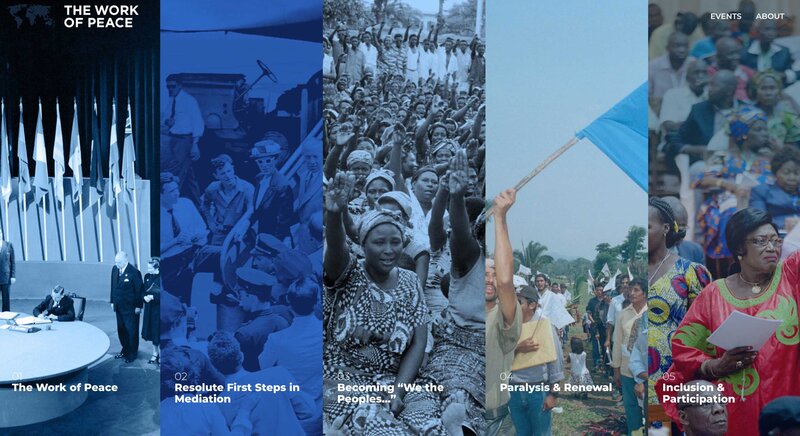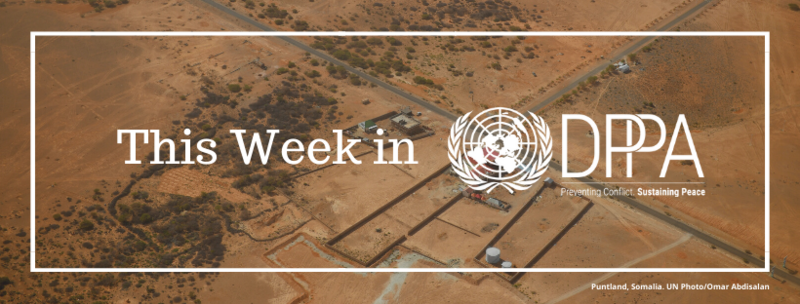Security Council
DiCarlo: “Recovering better” from COVID-19 also requires more political and financial investment to strengthen conflict prevention
Under-Secretary-General Rosemary DiCarlo on 25 January briefed the Security Council on the impact of the COVID-19 pandemic on peace and security. “The pandemic was impossible to predict. Many of its consequences on peace and security are not. Not surprisingly, COVID-19 has hit hardest in the most vulnerable places and among the most vulnerable people. This is why “recovering better” must involve strengthening our capacity for prevention with more political and financial investment. The support of the international community in this endeavor is critical,” Ms. DiCarlo said.
Read her full remarks here
Read more in UN News
UN ready to support Palestinian elections
New Special Coordinator Tor Wennesland on 26 January updated the Council on the Middle East peace process. He welcomed the decree to hold legislative, presidential and Palestinian National Council elections this year. “The holding of elections in the occupied West Bank, including East Jerusalem, and Gaza will be a crucial step towards Palestinian unity, giving renewed legitimacy to national institutions, including a democratically elected Parliament and Government in Palestine. The United Nations stands ready to support efforts for the Palestinian people to exercise their democratic rights,” the Special Coordinator said.
Read his full remarks here
Read more in UN News
Ceasefire in Libya continues to be observed
Acting Special Representative Stephanie Williams on 28 January briefed on the recent progress in the peace process in Libya. She was pleased to report that the ceasefire signed in Geneva on 23 October continues to be observed. “Libyans are keen to turn the page, to reclaim Libyan sovereignty and ownership of their destiny as a people after many years of relentless armed conflict, societal fragmentation, and crippling institutional division. This rejuvenation of Libyan patriotism must be sustained, harnessed, and supported by this Council to open a new path for Libya towards democracy, respect for human rights, accountability and justice under the rule of law,” Ms. Williams said.
Read her full statement here
Read more in UN News
Afghanistan
Global Open Days discussions emphasize inclusion of women’s voices in peace talks
The inclusion of women in peace negotiations and other decision-making processes has been the focus of a series of discussions currently taking place across Afghanistan, marking ‘Global Open Days’. Hundreds of women and representatives from government, religious institutions, academia and civil society have taken part in the UNAMA-backed events in numerous regions and provinces. Since November through January, events have taken place in Bamyan, Herat, Kabul, Kandahar, Khost, Jalalabad, Maimana and Mazar to reaffirm the critical role that Afghan women play as peace brokers and peacekeepers, and why their inclusion in the Afghanistan Peace Negotiations is beneficial to the country.
Read more here
Iraq
New report on the right to education
On the occasion of International Education Day on 24 January, UNAMI Human Rights Office, jointly with the Office of the UN High Commissioner for Human Rights (OHCHR), published the second report in a series on The Right to Education in Iraq: Obstacles to Girls’ Education after ISIL. “Measures to ensure equality of access to education engender broader human rights dividends for society as a whole, including long-term peace and stability”, said Danielle Bell, Chief UNAMI Human Rights Office and OHCHR Representative in Iraq. “The report provides practical recommendations to address specific institutional and societal barriers girls face to access education and aims to promote inclusive and equitable education for all children in Iraq”.
Download the report here
Yemen
Fifth meeting of the Supervisory Committee on Prisoners and Detainees
The fifth meeting of the Supervisory Committee on the Implementation of the Prisoners and Detainees Exchange Agreement kicked off in Amman, Jordan, on 24 January. The Committee resumes discussions between the parties to the conflict in Yemen to discuss the release of more detainees following the release of 1056 detainees last October. The Special Envoy for Yemen Martin Griffiths opened the meeting and said: “I urge the parties to prioritize in their discussions the immediate and unconditional release of all sick, wounded, elderly and children detainees as well as all arbitrarily detained civilians, including women. I also urge the parties to discuss and agree on names beyond the Amman meeting lists to fulfill their Stockholm commitment of releasing all conflict-related detainees as soon as possible.”
Read more here
Somalia
Visits to Federal Member States
This week, James Swan, Special Representative and Head of UNSOM, has continued his visits to Federal Member States (FMS). He visited Galmudug on 24 January, Puntland on 25 January, and Hirshabelle on 28 January. Mr. Swan met with FMS leadership to discuss how the UN system can provide support, and also highlighted the need for a constructive compromise between the Federal Government and the FMS to reach an agreement over implementation of the electoral process. “We urge all of Somalia’s leaders to make every effort to engage in dialogue in a collegial spirit so that the national elections are held on the basis of broad consensus, rooted in the September 17th Agreement, and underpinned by transparency, fairness and inclusivity,” he said at a press conference in Galmudug.
|
|
“It is important to acknowledge the progress that has been made”
Thirty years since the outbreak of Somalia’s civil war, senior UN officials on 27 January paid tribute to the courage and resilience of Somali citizens who have persevered through some of the “toughest conditions in any country on the planet over the past three decades.” “While enormous challenges remain and the road ahead, at times, looks long and hilly, it is important to acknowledge the progress that has been made,” Special Representative James Swan said. Mr. Swan addressed the media at a virtual press conference in Mogadishu, at which he and other senior UN officials spoke about the range of the world body’s support over the past year but also for 2021.
Read more here
West Africa
Inclusiveness crucial to prevent conflicts
Mohamed Ibn Chambas, Special Representative and Head of UNOWAS, on 23 January addressed the 58th Ordinary Session of the Economic Community of West African States (ECOWAS) Authority of Heads of State and Government, that was held virtually. “I wish to reiterate that electoral and indeed political processes anchored on consensus and inclusiveness with full participation of women, youth and people living with disabilities, can significantly contribute to prevent conflicts and address some of the peace and security challenges in our region,” Mr. Ibn Chambas said.
Read more here
Joint visit to Cabo Verde and Sierra Leone
Special Representative Mohamed Ibn Chambes and the Chairperson of the African Union Commission, Moussa Faki Mahamat, conducted a joint visit to Sierra Leone and Cabo Verde this week. The joint visit was part of the UN and AU continued partnership to support the countries of the sub-region address peace, security and development challenges. In Freetown, they met with Julius Maada Bio, President of the Republic of Sierra Leone with whom they discussed a range of national and regional issues, including the post-COVID recovery plans. In Praia, they had a meeting with the Prime Minister, José Ulisses Correia e Silva, and were received by Jorge Carlos Fonseca, President of Cabo Verde.
Read more here
Colombia
Educational talks on restorative justice for former combatants
The UN Verification Mission in Colombia accompanied, this week, the cycle of educational talks that the Special Jurisdiction for Peace (JEP) is giving to former combatants. The workshops were held in the department of Caldas in central-western Colombia, in the indigenous reservation of Cañamomo Lomaprieta, and about 40 former combatants of the FARC-EP participated. The UN Mission has been accompanying this group of ex-combatants in different income-generating projects, carried out jointly with the community, and supports the socialization of the responsibilities they must fulfill with the Special Jurisdiction for Peace.
Peacebuilding
Member States pledge $439 million for the Peacebuilding Fund
During the High-Level Replenishment Conference for the Peacebuilding Fund on 26 January, Member States pledged $439 million for the Fund’s 2020-2024 strategy. The Conference, chaired by the Secretary-General, took place at a time of unprecedented challenges and as the world contends with the tragic immediate effects of the pandemic and its alarming medium to long-term impacts. The unprecedented economic shocks and inadequate response strategies are entrenching social and economic inequalities and increasing risks for crisis, eroding peace and development gains along the way. 92 Member States joined the Conference.
Read more here
Mediation
New publication on constitutions and peace processes
At a virtual event on 28 January, the Berghof Foundation and the Mediation Support Unit of DPPA’s Policy and Mediation Division launched a new publication on constitutions and peace processes. Peace processes often confront conflict issues that have deep constitutional relevance, and yet the obvious link to “constitution making” and the need for constitutional expertise are seldom acknowledged. The role of constitution making in peace processes is understudied and there is little practical guidance for individuals involved in peace processes, especially the mediators, negotiators and other actors who support them, on how to engage with constitutional elements in peace processes.
Read the publication here
Next Week
Security Council
The United Kingdom will assume the presidency of the Security Council for February.
Updated programme of work here
The Work of Peace
Virtual exhibit
Remember to check out our virtual exhibit: The Work of Peace. It highlights the UN’s key role in preventive diplomacy, good offices, mediation and elections over the past 75 years, and looks ahead at what the future may hold for this work.
Enter here

|










